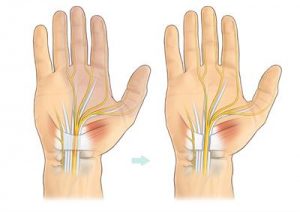What is Carpal Tunnel Syndrome?
Carpal Tunnel Syndrome is a very common condition. It is caused by pressure on the median nerve in your wrist which runs through the carpal tunnel, a narrow passageway surrounded by bones and ligaments. When the median nerve is compressed it can cause numbness, tingling and weakness in the hand and arm and can lead to difficulty gripping. Symptoms can become worse at night and patients will often wake up with numb or tingly hands.
What are the non-surgical treatment options for carpal tunnel syndrome?
Treatment for carpal tunnel syndrome will depend on the severity of the condition and before having surgery your consultant may advise some non-surgical options. For example, symptoms might be helped by making small lifestyle changes such as avoiding anything that makes symptoms worse and taking regular breaks from repetitive tasks. Exercises may also help. In some cases a splint, a little like a fingerless glove, may be recommended. It will keep your wrist in a straight, neutral position so pressure on the median nerve is minimised and movements that can make carpal tunnel syndrome worse are limited.
If there is no improvement after these steps, steroid injections can be used to reduce swelling in the carpal tunnel, which relieves the pressure on the median nerve. Results vary and might be short lived but could be long term.
What is carpal tunnel release surgery?
 Carpal tunnel release surgery is a very simple procedure to enlarge the carpal tunnel to create more space and relieve pressure on the median nerve. It can be performed in an outpatient setting, without any need for a general anaesthetic, operating theatre or overnight stay. A local anaesthetic is used to numb the area. Your consultant will then make a small incision in the wrist to cut the carpal ligament. Once this has been done, the incision will be closed and a dressing applied.
Carpal tunnel release surgery is a very simple procedure to enlarge the carpal tunnel to create more space and relieve pressure on the median nerve. It can be performed in an outpatient setting, without any need for a general anaesthetic, operating theatre or overnight stay. A local anaesthetic is used to numb the area. Your consultant will then make a small incision in the wrist to cut the carpal ligament. Once this has been done, the incision will be closed and a dressing applied.
How long will it take to recover from carpal tunnel release surgery?
You will be able to go home soon after your procedure. Your hand may remain numb for several hours and as the anaesthetic begins to wear off you will feel tingling. You should take pain medication before the anaesthesia wears off to help with any discomfort as feeling returns to your hand. You will get relief from your symptoms immediately but expect to have some pain and swelling from the procedure for some weeks.
For the first week your hand will be bandaged and completely out of action but you are encouraged to move your fingers to prevent stiffness. After two weeks you will be able to use your hand but should avoid anything too strenuous. Your stitches will be removed around 2 weeks after surgery, or dissolvable stitches will disappear after 2 to 3 weeks. You won’t be able to drive for 1 – 2 weeks and will need time off work to allow your hand to heal. It may be around 12 weeks before your full grip strength returns.

 One Ashford
One Ashford One Hatfield
One Hatfield